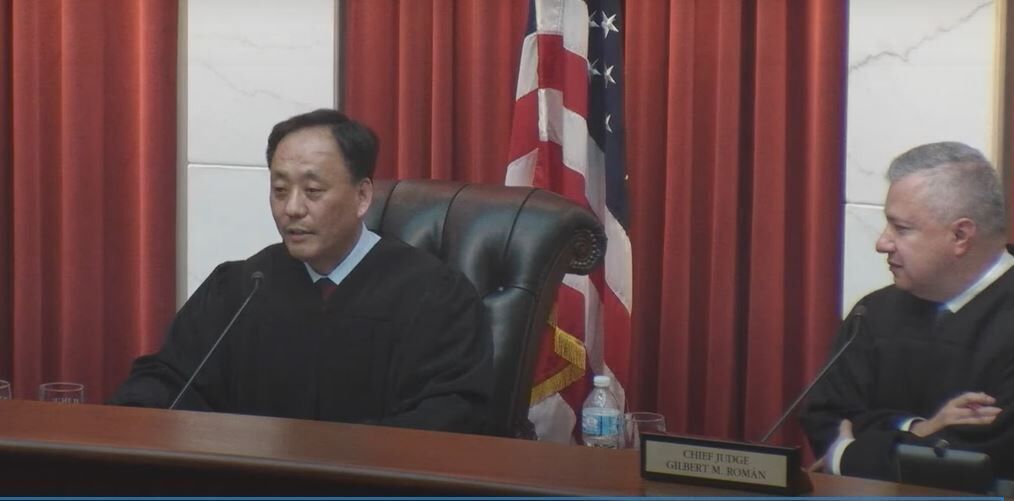Tina Peters sentenced, Colorado justices turn down relief for felony murder defendants | COURT CRAWL
Welcome to Court Crawl, Colorado Politics’ roundup of news from the third branch of government.
A high-profile elections case out of Western Colorado came to a close for now, while the state Supreme Court rejected the notion that certain defendants should be able to seek reductions to their lifetime prison sentences.
Peters trial
• Former Mesa County clerk Tina Peters, a Republican who also unsuccessfully ran for secretary of state in 2022, stands convicted of seven criminal charges related to a security breach of her office’s elections equipment. Last week, she received a sentence of nine years in prison after remaining defiant about her actions.
• “It’s my impression distinctly that you never took your job of clerking particularly seriously. You didn’t complete the certification. One scandal after another followed you in your time as the clerk. And ultimately it was a belief that the echo chamber in which you live couldn’t be wrong among other things, that led you to do what you did here.” —District Court Judge Matthew Barrett during sentencing

In this file photo, Mesa County Clerk Tina Peters takes part in a debate between candidates for Colorado Republican Party chair on Feb. 25, 2023, in Hudson.
Felony murder sentences
• Colorado’s justices declined to find that people with older convictions for felony murder — meaning they did not kill the victim themselves — are entitled to a resentencing after a 2021 law change. Instead of life in prison without parole, current felony murder defendants are only subject to 48 years in prison.
• “The Court’s opinion overlooks the fact that the vast majority of states do not allow for mandatory life without parole for the type of broad felony murder liability we have in Colorado. There are people serving life without parole in Colorado who did not kill anyone and had no intent to kill anyone, but were still mandated to die in prison.” —The Spero Justice Center in Denver, one of the organizations that weighed in to the Supreme Court
• “It was the view of the sponsors that a mandatory life without parole sentence for felony murder, particularly for the less culpable defendant, was unfair, often grossly disproportionate and not consistent with evolving standards of decency in a civilized society. … The Supreme Court appears to have misunderstood the intention of the General Assembly when it made the bill apply only to cases after September 15, 2021.” —Former Sen. Pete Lee, D-Colorado Springs, the sponsor of the 2021 change to the felony murder law

Sen. Pete Lee, D-Colorado Springs, comments on Senate Bill 124, which changes the sentences for felony murder, during an April 26, 2021, signing ceremony.
Other Supreme Court decisions
• The justices concluded motorists injured in on-the-job vehicle accidents by third parties may seek workers’ compensation in addition to benefits from their employer’s insurance company.
• By 5-2, the Supreme Court overturned a Ouray County judge’s sanction on the prosecution for late-disclosed evidence, while the dissenting justices pointed out the prosecution suggested the sanction in the first place.
• The Supreme Court has elected to hear three cases involving 1.) whether a man convicted of murder can be retried in the wake of his jury’s contradictory verdict, 2.) whether local governments can authorize for-profit entities to exceed the state’s noise limits and 3.) whether jurors are entitled to hear about a victim’s suicidality in the trial of the man who supplied him with fentanyl.
In federal news
• The U.S. Court of Appeals for the 10th Circuit concluded a man’s privacy rights were not implicated by a warrantless search of his belongings in an apartment building’s storage locker.
• A federal judge agreed a woman plausibly alleged the city of Aurora’s policies motivated an off-duty officer’s physical attack on her.
• A federal judge refused to alter her ruling allowing only some claims to proceed to trial against Denver for its police officers’ response to 2020 protests.

FILE -Denver police officers move during a protest outside the state Capitol over the death of George Floyd Saturday, May 30, 2020, in Denver. A federal jury’s $14 million award to Denver protesters injured during 2020 demonstrations over the killing of George Floyd could resonate nationwide as courts weigh more than two dozen similar lawsuits.(AP Photo/David Zalubowski, File)
• Plaintiffs who have spent two years trying to block a handful of assault weapons ordinances in Boulder County are on thin ice, as a judge believed they do not have standing to sue.
• Jurors will now decide whether two Denver officers violated a man’s First Amendment rights when they arrested him for recording at a police station.
Miscellaneous proceedings
• Tomorrow, certain floors of the Ralph L. Carr Colorado Judicial Center’s office tower will reopen to the public after extensive damage caused by an intruder in January.
• A trial is proceeding in Denver District Court to potentially block the merger of grocery giants Kroger and Albertsons, with Attorney General Phil Weiser‘s office making the case against the consolidation.











